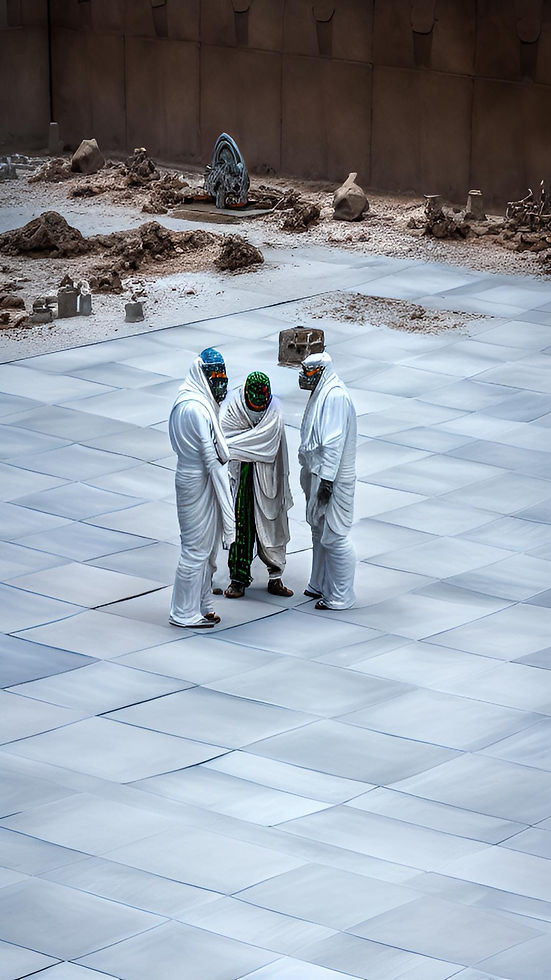
Moving Forward: Rebuilding Knowledge and Truthfulness in Discourse
- quantumsymbols
- Apr 1, 2025
- 4 min read
In our rapidly evolving digital age, the fabric of public discourse is under unprecedented strain. Misinformation, half-truths, and echo chambers permeate our conversations, creating an environment where knowledge and truthfulness are often overshadowed. As citizens of a democratic society, it is crucial for us to bridge this divide and restore the foundation of meaningful dialogue. In this blog post, we will explore the avenues for combating misinformation, fostering critical thinking, and promoting a culture of intellectual honesty.
The Landscape of Misinformation
The current landscape of misinformation poses a significant challenge to public discourse. A study from the Pew Research Center indicates that nearly 64% of the American population believes that made-up news significantly impacts their views on issues. This prevalence of misinformation can lead to real-world consequences, from voting behavior to public health decisions.

To combat this tide, we need to understand where misinformation arises. Social media platforms like Facebook and Twitter can amplify false information, often faster than the truth can emerge. Algorithms prioritize engagement over accuracy, creating a breeding ground for sensationalist and misleading content. Understanding this context is crucial as it allows us to take proactive measures toward mitigating its spread.
Fostering Critical Thinking in Education
Education plays a pivotal role in equipping individuals with the cognitive tools necessary to navigate misinformation. A curriculum that emphasizes critical thinking encourages students to analyze information rather than accepting it at face value. Reinforcing skills such as skepticism, inquiry, and discernment enable learners to question sources and seek evidence.

For example, the implementation of media literacy programs in high schools has shown promising results. Students learn to identify reliable sources, differentiate between opinion and fact, and understand the mechanics of persuasive writing. According to a study conducted by Common Sense Media, students who participated in media literacy programs were significantly better at discerning misinformation than their peers who did not.
The Importance of Media Integrity
The media landscape is undergoing transformation at an exceptional pace. Traditional news outlets face competition from online platforms that prioritize speed over accuracy. While it is essential to adapt to this new environment, it is equally critical for media organizations to uphold standards of integrity and accountability.
One strategy is to engage in collaborative journalism, where multiple news outlets work together to fact-check stories before publication. An example of this is the "FactCheck.org" initiative, which analyzes claims made by public figures and provides clear, evidence-based rebuttals. By prioritizing accuracy and transparency, media organizations can foster public trust and reinforce the idea that truthfulness is paramount in discourse.
The Role of Individual Responsibility
While institutions play a critical role in shaping discourse, individual responsibility cannot be overlooked. Each of us has a part to play in ensuring that the information we share is accurate and arrives from reputable sources. Practicing digital hygiene—like double-checking facts before sharing and being mindful of biases—can help counter misinformation's reach.

Moreover, engaging in conversations about misinformation can help raise awareness in our social circles. People may not realize the impact of false information on societal beliefs and behaviors. By initiating respectful dialogues and providing evidence when discussing contentious issues, individuals can create a culture where truth is valued and misinformation is challenged.
Cultivating a Culture of Intellectual Honesty
Cultivating intellectual honesty in our conversations is essential for rebuilding trust in public discourse. This involves acknowledging the limits of our knowledge and recognizing that we can learn from others. When we hold space for diverse perspectives, we can engage with ideas that challenge our beliefs, thereby enriching our understanding of complex issues.
One effective strategy for promoting intellectual honesty is the practice of respectful disagreement. Instead of dismissing opposing views as misguided, engaging in constructive discussions allows us to learn and appreciate different viewpoints. Additionally, creating forums for community dialogue—such as town hall meetings or online discussion groups—can facilitate open exchanges of ideas where truthfulness is prioritized.
Moving Forward Together
Moving forward, we must grasp the urgency of restoring knowledge and truthfulness in public discourse. By prioritizing education, ensuring media integrity, practicing individual responsibility, and cultivating a culture of intellectual honesty, we can combat the rampant spread of misinformation. These actions require all of us to become proactive participants in our communities.
As stated by author and journalist Susan Glasser, "In a world where we can create our own truth, we must continuously challenge ourselves to seek out the truth." Engaging critically with the information we consume and share not only enriches our own understanding but also enhances the broader dialogue within society.
Let us take the necessary steps to ensure that our public discourse is grounded in knowledge and truthfulness, paving the way for a healthier democratic society. Through collective effort, we can rebuild the foundation of our discourse, leading to informed and engaged citizens.




Comments